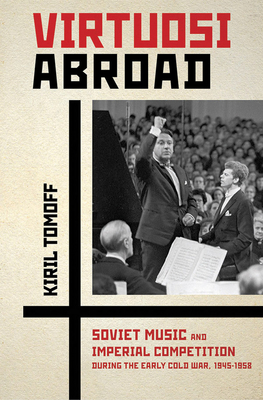

 Cornell University Press
Cornell University Press
Virtuosi Abroad: Soviet Music and Imperial Competition During the Early Cold War, 1945-1958


Key Metrics
- Kiril Tomoff
- Cornell University Press
- Hardcover
- 9780801453120
- 9.5 X 6.4 X 0.9 inches
- 1.1 pounds
- Social Science > Popular Culture
- English
 Secure Transaction
Secure TransactionBook Description
In the 1940s and 1950s, Soviet musicians and ensembles were acclaimed across the globe. They toured the world, wowing critics and audiences, projecting an image of the USSR as a sophisticated promoter of cultural and artistic excellence. In Virtuosi Abroad, Kiril Tomoff focuses on music and the Soviet Union's star musicians to explore the dynamics of the cultural Cold War. He views the competition in the cultural sphere as part of the ongoing U.S. and Soviet efforts to integrate the rest of the world into their respective imperial projects.Tomoff argues that the spectacular Soviet successes in the system of international music competitions, taken together with the rapturous receptions accorded touring musicians, helped to persuade the Soviet leadership of the superiority of their system. This, combined with the historical triumphalism central to the Marxist-Leninist worldview, led to confidence that the USSR would be the inevitable winner in the global competition with the United States. Successes masked the fact that the very conditions that made them possible depended on a quiet process by which the USSR began to participate in an international legal and economic system dominated by the United States. Once the Soviet leadership transposed its talk of system superiority to the economic sphere, focusing in particular on consumer goods and popular culture, it had entered a competition that it could not win.
Author Bio
Kiril Tomoff joined the faculty at UCR in 2001 after completing with distinction his Ph.D. in Russian and Soviet History at the University of Chicago. He completed his undergraduate work summa cum laude at the University of Arizona in 1992. In 1998-99, he received a Fulbright-Hays Doctoral Dissertation Abroad Fellowship, which enabled him to spend significant time in Moscow, doing archival research, listening to great music, and drinking the occasional shot of vodka.
He has presented papers at regional, national, and international conferences in the United States, Norway, Hungary, Germany, and Australia. He returned to Moscow in 2004 as the Director of the Moscow Study Center of the University of California's Education Abroad Program, and in the summer of 2006 he co-organized a Festschrift conference in Melbourne, Australia, honoring the career thus far of his advisor Sheila Fitzpatrick. An active and serious amateur horn player, Tomoff has tried to combine his interests in music and Russian history.
His articles and a review on Soviet musical life have been published in the U.S., U.K., Norway, and Germany, including in the journals The Russian Review, Kritika, Contemporary European History, Slavonica, and Russian History/Histoire Russe. His book Creative Union: The Professional Organization of Soviet Composers, 1939-1953 is published by Cornell University Press and was released in the spring of 2006. It provides the first ever in-depth analysis of the professional organization of Soviet composers during the Stalin period. He is currently working on a project examining the construction of a Soviet cultural sphere after World War II.
Besides modern Russian history, his teaching interests include 20th-century Europe and the 20th-century world.
Source: University of California, Riverside
Videos






Community reviews
Write a ReviewNo Community reviews